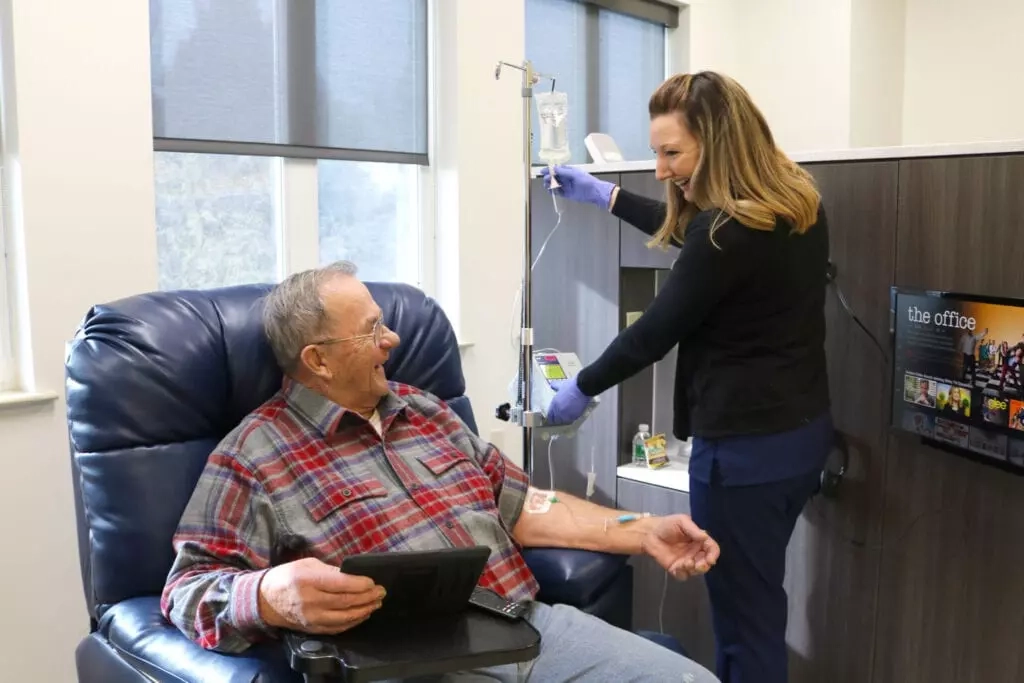Psoriasis Infusion Therapy
Psoriasis is a chronic skin condition that causes cells to build up rapidly on the skin's surface. This leads to the formation of thick, scaly patches that can be itchy, red, and sometimes painful. It's an autoimmune disorder, meaning the body's immune system mistakenly attacks healthy skin cells. Psoriasis can appear anywhere on the body but often affects the elbows, knees, scalp, and lower back. While not contagious, it's a long-lasting condition that typically goes through cycles of flaring up and calming down. Stress, infections, and certain medications can trigger or worsen psoriasis. Although there's no cure, various treatments can help manage symptoms and improve the appearance of affected skin. Psoriasis can impact quality of life, but with proper care, many people effectively control their condition.

Symptoms

Symptoms
Common symptoms of psoriasis include:
- Red, raised patches of skin
- Silvery-white scales on the red patches
- Dry, cracked skin that may bleed
- Itching or burning sensation
- Thick, pitted nails
- Swollen and stiff joints
- These symptoms can vary in severity and location, and may include:
- Small, scaly spots (commonly in children)
- Smooth, red patches in body folds (inverse psoriasis)
- Widespread redness and scales (erythrodermic psoriasis)
- Pus-filled bumps (pustular psoriasis)
Symptoms often occur in cycles, with periods of worsening (flares) followed by improvement or remission. If you notice persistent, unusual changes in your skin, it's advisable to consult a dermatologist for proper diagnosis and treatment.

Treatment Options
Treatment options for psoriasis include:
- Topical treatments:
- Corticosteroid creams
- Vitamin D analogues
- Retinoids
- Calcineurin inhibitors
- Coal tar
- Light therapy (phototherapy):
- UVB light
- PUVA (psoralen plus UVA light)
- Systemic medications:
- Methotrexate
- Cyclosporine
- Oral retinoids
- Biologics:
- TNF-alpha inhibitors (e.g., adalimumab, etanercept)
- Interleukin inhibitors (e.g., ustekinumab, secukinumab)
- Oral medications:
- Apremilast
- Newer oral treatments (e.g., deucravacitinib)
- Lifestyle changes:
- Moisturizing regularly
- Avoiding triggers (stress, certain foods, alcohol)
- Quitting smoking
Treatment plans are typically tailored to the individual based on the severity of psoriasis, affected areas, and patient preferences. The goal is to reduce inflammation, slow skin cell growth, and relieve symptoms.

Living With
Living with psoriasis means dealing with itchy, scaly skin patches that can flare up due to stress, weather, or infections. While not contagious, it can run in families and affect self-esteem. Managing the condition often involves a mix of treatments like creams, light therapy, or oral medications, along with lifestyle changes such as diet adjustments and stress reduction. Regular moisturizing helps soothe irritated skin, and symptoms may cycle through periods of improvement and worsening. Some individuals also experience joint pain, known as psoriatic arthritis. To effectively manage psoriasis, it's crucial to work closely with a dermatologist to find the most suitable treatment plan.
Meet our Infusion Specialists
Jalal Thwainey M.D.
Medical Director
Emilie Wojcik, N.P.
Director of Clinical Services
For Provider
Simplify patient referrals and offer advanced treatment options with our infusion partnership program.
For Patient
There may be a better way to manage your condition – explore infusion therapy.





